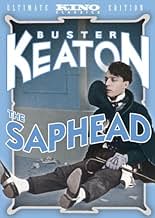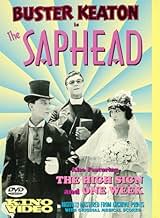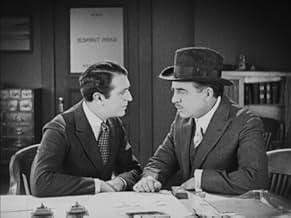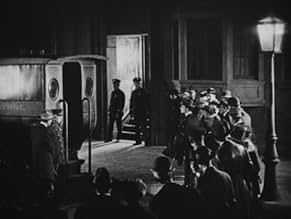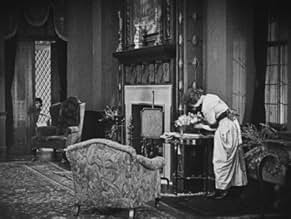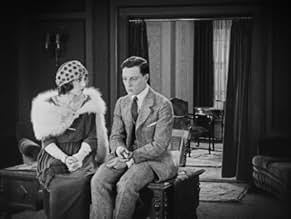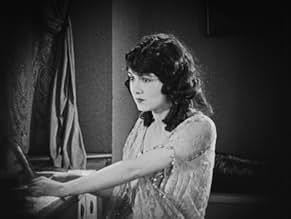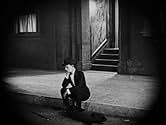IMDb RATING
6.1/10
1.9K
YOUR RATING
The simple-minded son of a rich financier must find his own way in the world.The simple-minded son of a rich financier must find his own way in the world.The simple-minded son of a rich financier must find his own way in the world.
- Awards
- 1 nomination total
Katherine Albert
- Hattie
- (uncredited)
George Berrell
- Jim Hardy from Arizona
- (uncredited)
Henry Clauss
- Valet
- (uncredited)
Alfred Hollingsworth
- Hathaway
- (uncredited)
Helen Holte
- Henrietta Reynolds
- (uncredited)
Jeffrey Williams
- Hutchins
- (uncredited)
Featured reviews
If there is any humor in this movie, it is carefully concealed. Buster Keaton gives an energetic performance in what is otherwise a dubious attempt at self-effacing humor. Now, under certain circumstances self- effacing humor can be effective but not in this movie. The story is contrived, and Mr. Keaton's character is so shallow that one must wonder why anyone would pay him any attention at all. Irving Cummings and William Crane carry this movie. They give strong dramatic performances. Mr. Keaton's attempt at humor through deadpan is out of place in this movie. It simply is not funny. It does not generate laughs. Nor is his character particularly lovable. His character, Bertie, is spoiled and shallow. His love interest with the female lead is strained and entirely implausible. The plot is predictable. The movie does have some effective moments, such as when the Crane and Cummings characters confront each other and the frantic scenes of trading on the floor of the stock market, but otherwise the movie's value lies mostly in the its status as a quaint antique of movie making from a bygone era.
While it is certainly not up to the standard of the later films that Keaton would direct and/or write himself, "The Saphead" is still a nice little film, and the last part is excellent, a sign of things to come. It would be worth watching for the last 20 minutes alone, and the first part is not bad either, just old-fashioned and sometimes a bit slow.
Keaton plays Bertie, the timid son of a rich businessman. Most of the film involves the business and romantic difficulties of Bertie, his sister, and his brother-in-law. It's slow at times, with some melodrama and a fair amount of mild humor but not a lot of really funny material. It's a decent story of the kind common to silent films, is usually pleasant to watch, and is important as the prelude and setup to the climax. In the last part of the film, Bertie joins the stock exchange, and all the story lines come together in a creative and very entertaining sequence that finally gives Keaton a chance to display his great variety of comic skills.
If you enjoy Keaton's other films, this one is not up to their level, but it is still worth watching.
Keaton plays Bertie, the timid son of a rich businessman. Most of the film involves the business and romantic difficulties of Bertie, his sister, and his brother-in-law. It's slow at times, with some melodrama and a fair amount of mild humor but not a lot of really funny material. It's a decent story of the kind common to silent films, is usually pleasant to watch, and is important as the prelude and setup to the climax. In the last part of the film, Bertie joins the stock exchange, and all the story lines come together in a creative and very entertaining sequence that finally gives Keaton a chance to display his great variety of comic skills.
If you enjoy Keaton's other films, this one is not up to their level, but it is still worth watching.
Something like The Saphead isn't what you would expect to be Buster Keaton's feature film debut. The whole thing seems too ordinary, too stagey and melodramatic to be so. This is due to the fact that The Saphead was not a Keaton-helmed project; he was suggested for the role of the rich young man Bertie by Douglas Fairbanks, who had previously played the role on Broadway.
Bertie is the first of the spoiled, clueless young man types that Keaton would later return to in The Navigator and Battling Butler. He seeks to impress a sweet young woman named Agnes by coming across as a bad boy, gambling well into the morning hours and having breakfast in the afternoon. His father confronts him about this behavior and has him cut off until he can find a job. Bertie seeks out to do just that, in the meantime winning the hand of his girl-- well, almost. During the ceremony, his sister's slimy husband Mark receives letters from his recently deceased mistress Henrietta, asking him to take care of their illegitimate child. His secret about to be revealed, he presses the letters on Bertie, breaking Agnes' heart and bringing the union to an abrupt end. Fortunately, things manage to pick back up after Bertie unwittingly saves the family stock business.
While there are a few Keaton-esque moments every now and then, for the most part The Saphead is just a typical stage to film adaptation of the period. Unlike the films Keaton would later star in and direct, this picture lacks spontaneity and laughs. The action on screen never comes alive until the climax, when Keaton finally gets to jump and be thrown around as he dashes through the trading floor and saves the day. The entire movie isn't a bore, however, and there are a few humorous inter-titles and gags, but it's just doesn't have a story that seems to suit the particular talents of its main star.
Bertie is the first of the spoiled, clueless young man types that Keaton would later return to in The Navigator and Battling Butler. He seeks to impress a sweet young woman named Agnes by coming across as a bad boy, gambling well into the morning hours and having breakfast in the afternoon. His father confronts him about this behavior and has him cut off until he can find a job. Bertie seeks out to do just that, in the meantime winning the hand of his girl-- well, almost. During the ceremony, his sister's slimy husband Mark receives letters from his recently deceased mistress Henrietta, asking him to take care of their illegitimate child. His secret about to be revealed, he presses the letters on Bertie, breaking Agnes' heart and bringing the union to an abrupt end. Fortunately, things manage to pick back up after Bertie unwittingly saves the family stock business.
While there are a few Keaton-esque moments every now and then, for the most part The Saphead is just a typical stage to film adaptation of the period. Unlike the films Keaton would later star in and direct, this picture lacks spontaneity and laughs. The action on screen never comes alive until the climax, when Keaton finally gets to jump and be thrown around as he dashes through the trading floor and saves the day. The entire movie isn't a bore, however, and there are a few humorous inter-titles and gags, but it's just doesn't have a story that seems to suit the particular talents of its main star.
He's rich, he's a bit lazy, he gets the girl in the first half-hour, he even smiles a bit. It's not the Buster Keaton you expect. But he's still Keaton, and even if his first feature film creaks a good deal, he keeps you entertained.
"The Saphead" presents the story of Bertie Van Alstyne (Keaton), son of Wall Street tycoon Nicholas Van Alstyne (William H. Crane). Bertie lives a life of Manhattan luxury but secretly pines for the beautiful Agnes (Beulah Booker), who secretly pines for Bertie in turn. Happiness appears at hand until a strange turn of events shatters their union.
A 1920 production of a hit stage play, "The Saphead" was designed to fit audience conventions of the day, not showcase Keaton's still-emerging comic persona. Sentiment and improbable coincidences run rampant here. Given that, it's impressive how well the Keaton we would come to know is presented. He is given many chances to present his clownish athleticism, as well as that expressionless-yet-not-emotionless manner that has beguiled film lovers for decades.
Was Herbert Blaché, the credited director, preternaturally wise to Keaton's style? Or did Keaton just know how to get his way even before he enjoyed full control of his features?
The problem with "The Saphead" is not Keaton, but its construction. In the first ten minutes, we are introduced to everyone in the film except Bertie, and given background about an adulterous affair that is then dropped for the Bertie story. Forty-five minutes in the two story lines come together, and in such a convoluted way as to beggar belief. Bertie is somehow pressed into taking the blame for the affair, even though it's obvious his brother-in-law is the guilty party.
Cue violins. A lot of "The Saphead" works toward this kind of sentimental dithering, even the Keaton parts, which get a bit strange. Bertie confesses his love to Agnes accidentally, when he tells his sister Rose about it. (Since Nicholas Van Alstyne adopted Agnes, doesn't that make her Bertie's sister, too?) Agnes is standing right there, though, and gives Bertie a bit of a shock before he recovers and takes her hand. This is strictly Buster for the old ladies.
The best way of watching "The Saphead" is as a couple of clever Keaton shorts with workmanlike connecting material. The first short would be Bertie's attempt to live a wastrel life, not because his heart is in it, but because he believes the modern woman "prefers sports to saints". To this end, in a great bit of physical comedy, Bertie tries to get arrested when his speakeasy is raided even though he successfully bribed a detective without knowing it. Every time he tries to enter the paddy wagon, someone pushes him back out.
The second short would be Bertie making his way on Wall Street in the last 20 minutes, overdressed in top hat, frock coat, and spats, being razzed by the other brokers. This culminates in a scene of wild physical comedy where Keaton runs around the trading floor, jumping on people and unknowingly buying up shares in his father's precious mine.
The Kino DVD I saw this on also has two shorts Keaton made at the same time, "The High Sign" and "One Week", which display Keaton as both director and star, and in much sharper form. "The Saphead" lacks the inventiveness of those shorts, but it works off-and-on as period entertainment thanks to Keaton and a good supporting cast. Booker is a typically shy Keaton-film beauty who delivers her scenes with grace. Crane has a fine comic moment sending his disgraced son off with a check for one million dollars "and not a penny more!"
It's not great cinema, but it's the start of great cinema, showing some the conventions of the time Keaton would do his part to break, and other conventions he would observe, en route to glory.
"The Saphead" presents the story of Bertie Van Alstyne (Keaton), son of Wall Street tycoon Nicholas Van Alstyne (William H. Crane). Bertie lives a life of Manhattan luxury but secretly pines for the beautiful Agnes (Beulah Booker), who secretly pines for Bertie in turn. Happiness appears at hand until a strange turn of events shatters their union.
A 1920 production of a hit stage play, "The Saphead" was designed to fit audience conventions of the day, not showcase Keaton's still-emerging comic persona. Sentiment and improbable coincidences run rampant here. Given that, it's impressive how well the Keaton we would come to know is presented. He is given many chances to present his clownish athleticism, as well as that expressionless-yet-not-emotionless manner that has beguiled film lovers for decades.
Was Herbert Blaché, the credited director, preternaturally wise to Keaton's style? Or did Keaton just know how to get his way even before he enjoyed full control of his features?
The problem with "The Saphead" is not Keaton, but its construction. In the first ten minutes, we are introduced to everyone in the film except Bertie, and given background about an adulterous affair that is then dropped for the Bertie story. Forty-five minutes in the two story lines come together, and in such a convoluted way as to beggar belief. Bertie is somehow pressed into taking the blame for the affair, even though it's obvious his brother-in-law is the guilty party.
Cue violins. A lot of "The Saphead" works toward this kind of sentimental dithering, even the Keaton parts, which get a bit strange. Bertie confesses his love to Agnes accidentally, when he tells his sister Rose about it. (Since Nicholas Van Alstyne adopted Agnes, doesn't that make her Bertie's sister, too?) Agnes is standing right there, though, and gives Bertie a bit of a shock before he recovers and takes her hand. This is strictly Buster for the old ladies.
The best way of watching "The Saphead" is as a couple of clever Keaton shorts with workmanlike connecting material. The first short would be Bertie's attempt to live a wastrel life, not because his heart is in it, but because he believes the modern woman "prefers sports to saints". To this end, in a great bit of physical comedy, Bertie tries to get arrested when his speakeasy is raided even though he successfully bribed a detective without knowing it. Every time he tries to enter the paddy wagon, someone pushes him back out.
The second short would be Bertie making his way on Wall Street in the last 20 minutes, overdressed in top hat, frock coat, and spats, being razzed by the other brokers. This culminates in a scene of wild physical comedy where Keaton runs around the trading floor, jumping on people and unknowingly buying up shares in his father's precious mine.
The Kino DVD I saw this on also has two shorts Keaton made at the same time, "The High Sign" and "One Week", which display Keaton as both director and star, and in much sharper form. "The Saphead" lacks the inventiveness of those shorts, but it works off-and-on as period entertainment thanks to Keaton and a good supporting cast. Booker is a typically shy Keaton-film beauty who delivers her scenes with grace. Crane has a fine comic moment sending his disgraced son off with a check for one million dollars "and not a penny more!"
It's not great cinema, but it's the start of great cinema, showing some the conventions of the time Keaton would do his part to break, and other conventions he would observe, en route to glory.
The Saphead" does not showcase Keaton the filmmaker, but rather Keaton the actor. The script is from a play, the directors are individuals Keaton never worked with before or hence, and the studio was Metro, predecessor of MGM. Keaton plays Bertie the Lamb, mild-mannered and spoiled son of Nick Van Alstyne, "the Wolf of Wall Street". In spite of the fact that Keaton had no creative input to the film and isn't actually its centerpiece, there is much to like about this film and much that is so Keatonesque. Keaton plays an old-fashioned romantic and someone that is thrust into the role of the fall guy by the actual bad guy - a theme he repeats in his own features. He also has down pat the part of being the well-dressed dapper man of the 1920's, which he repeats with more comic effect in "The Battling Butler", where he did have creative control.
Did you know
- TriviaFeature-film debut of Buster Keaton.
- GoofsWhen Bertie's car pulls up to the house after the aborted wedding, the front gate is closed, but when he gets out of the car it is wide open.
- Alternate versionsIn 1995, Film Preservation Associates copyrighted a version with an orchestral score; no details were specified on the print.
- ConnectionsFeatured in Buster Keaton: A Hard Act to Follow (1987)
- How long is The Saphead?Powered by Alexa
Details
- Release date
- Country of origin
- Language
- Also known as
- The New Henrietta
- Production company
- See more company credits at IMDbPro
- Runtime
- 1h 17m(77 min)
- Sound mix
- Aspect ratio
- 1.33 : 1
Contribute to this page
Suggest an edit or add missing content

